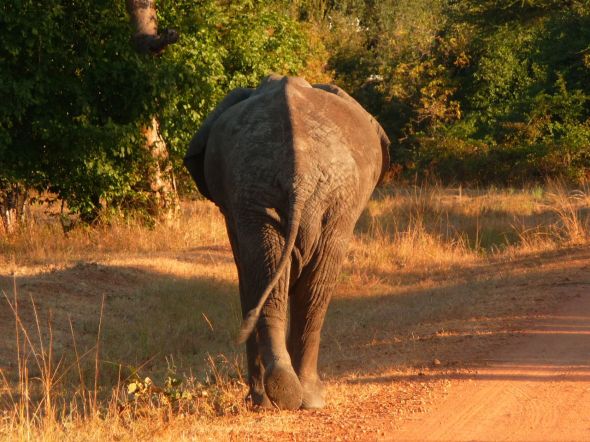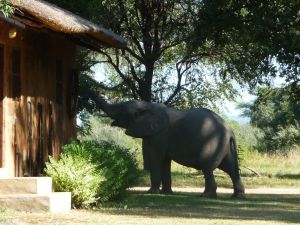The lion doesn’t sleep at night, the jungle isn’t quiet…but there is a bit of uwumewe-uwumewe!
Henry, our driver, had warned us that the road from Chipata to South Luangwa was awful; he said that was his least favourite road in the whole of Africa. He complained that it was so bad, that he had rebuffed all requests to visit the national park there for the last four years. Perhaps it was because we were such a good group of people, or we needed to be challenged (after all three of us had already been to Africa and two of those three had lived in Kenya for the past 6 months); maybe it was fear that we would be disappointed if we didn’t get to experience sleeping at a campsite that plays host to a whole cast of characters from the animal kingdom. Looking back, we are not really sure what exactly made Henry break his own rule of skipping South Luangwa, but we completely understand his rationale now.
The road did not deserve to be called a road. The 100 km trip, a mere fingertip from our starting point on the map, required us to rise before dawn, pack up tents, prepare breakfast and be on the road by 6:30 am. For the next 6 hours we barely ticked above 10 kph until the last 20 minutes of the journey. Rocking, rolling and jolting on the muddy red tracks; remnants of the infrequent traffic on this clogged artery carved into the dense bush, fringed with grass twice the height of a person, this land was harsh, dusty and mercilessly hot.
Occasionally, a cluster of huts could be seen nestling in a clearing set back from the road. I wondered what the people who lived here ate and how they sustained their families, as even in Malawi, a much poorer country than Zambia, the countryside was a neat patchwork of subsistence arable farms. The interior of Zambia looked comparatively desolate.
As we navigated the obstacle course of rutted dried mud and cavernous holes which looked like they had been formed by meteors, al the while shrouded in choking dust red dust. We stared longingly at the new road, which was nearing completion, to the left of us. Parts of it seemed to be lacking the last cosmetic touches; one could almost imagine a portly official cutting the ribbon at an inauguration ceremony, but Henry assured us that the last time he had been here, the road was also being built. Progress, if any, on this project would be on African, or more specifically, Zambian time. So we trundled along the red earth at 10 km/h mocked by the grey strip of asphalt which ran parallel but off limits to us. Diggers and road building equipment sat idle in the dirt. Not a single labourer was visible on the journey there or on the return trip three days later.
When we arrived at Croc Valley, named after the sly reptiles which ply the river at the back of the camp, it was already dark. After pitching tents and cooking dinner, we headed to the bar, which has been designed to emulate the features of traditional African architecture. It was possible to look out into the inky moonless night and just decipher the river, which hosted a large population of hippos whose grunts travelled across the water to give the impression that they were right next to us.
That night our sleep was fitful as we slept with the flysheets off our tents in wait of the animals which we had heard regularly prowled the camp, including lions. A pride had been sighted days before devouring a giraffe at the entrance to the camp, hippos were known to occasionally wander in and hyenas, baboons, elephants, monkey and others were also sometime visitors. As a precaution we had been banned from buying fruit that day because Henry knew the scent of it could make the elephants wild enough to attack the truck or wreck a tent (and unintentionally kill its inhabitants).
Unfortunately, or perhaps fortunately for us, nobody saw any lions prowling the camp that night (although it might have had something to do with the natural deterrent from nocturnal toilet visits which wild animals on the loose create!). However the next day we woke to find ourselves surrounded by a bouncing group of mischievous monkeys which had to be chased off before breakfast. The most exciting moment of the day was the unexpected arrival of a family of elephants, including a very small infant, which came to graze within the camp. For over an hour we watched them in awe as they strode through the camp eating their fill. In that hour the honour of getting so close to wild elephants made us realise that the bone rattling journey had all been worth it.








Leave a comment